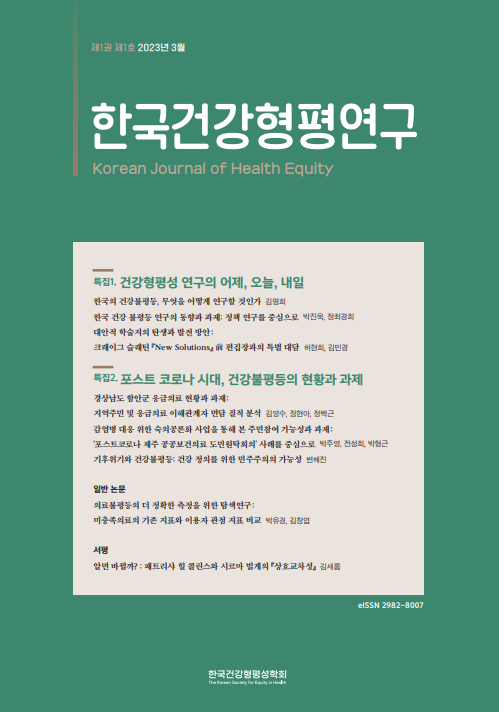- KOREAN
- E-ISSN2982-8007
 E-ISSN : 2982-8007
E-ISSN : 2982-8007
A Study on the Change in Care Burden and Health Level of Family Caregivers for the Elderly in Communities during the COVID-19 Pandemic
Boyoung Jeon (Department of Health and Medical Information, Myongji College)

Abstract
This research investigated changes in the caregiving burden and health status of primary family caregivers (PFC) providing care to the elderly in the community before and after the onset of the COVID-19 pandemic. The study delineated alterations in caregiving burdens, subjective health, pain and discomfort as physical health, and stress as mental health experienced by PFC beore and after COVID-19 pandemic period. Utilizingsing the 2019 and 2020 of the 2nd Korean Health Panel, the study focuses on 78 PFC to elderly individuals in need of care over the two-year span. The logit regression was conducted, to show the factors associated with deterioration of the outcomes before and after the COVID-19 pandemic. This study found that spousal relationships were most prevalent between PFC and the elderly, followed by daughter, son, and daughter-in-law. Despite a non-significant decrease in the caregiving burden from 76.9% before to 69.2% after the pandemic, there was a noteworthy surge in the prevalence of poor subjective health, escalating from 25.6% to 35.9%. Furthermore, a significant increase in pain and discomfort levels was observed, rising from 44.9% to 59%. While change of stress levels was not statistically significant. The caregiving burden of PFC before and after COVID-19 was lower than that of other groups in the first income quartile. Subjective health was found to be associated with providing care for elderly individuals with cancer and when taking home-based long-term care services. The exacerbation of pain and discomfort was linked to female caregivers, while increased stress levels were associated with the elderly with cancer and stroke. This study holds significance as it sheds light on the caregiving dynamics during the COVID-19 pandemic, elucidates changes in caregiving burden and health status among PFC, and underscores the societal imperative attention for family caregivers.
- keywords
- Family care, Care burden, Self-rated health, Physical health, Mental health, COVID-19 pandemic
- Submission Date
- 2024-01-13
- Revised Date
- 2024-02-04
- Accepted Date
- 2024-02-04
- Downloaded
- Viewed
- 0KCI Citations
- 0WOS Citations

